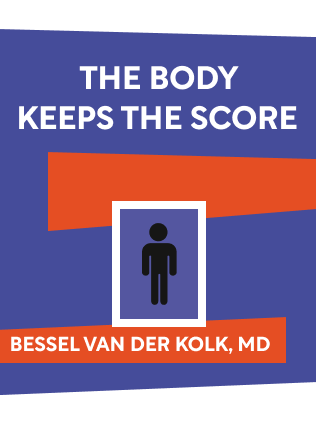

This article is an excerpt from the Shortform book guide to "The Body Keeps The Score" by Bessel van der Kolk. Shortform has the world's best summaries and analyses of books you should be reading.
Like this article? Sign up for a free trial here .
Are you looking for The Body Keeps the Score quotes? How can these quotes help you understand the book’s ideas about trauma and recovery?
These The Body Keeps the Score quotes can help you understand major concepts in the book about trauma, recovery, and PTSD.
Check out these 5 The Body Keeps the Score quotes and what they mean.
The Body Keeps the Score Quotes
These The Body Keeps the Score quotes can help you understand the book’s ideas about trauma, PTSD, and how to treat it. You can see in these The Body Keeps the Score quotes that the book’s author maps out how we define trauma, how PTSD is diagnosed, and many treatment options.
“As long as you keep secrets and suppress information, you are fundamentally at war with yourself…The critical issue is allowing yourself to know what you know. That takes an enormous amount of courage.”
One of the lasting impacts of trauma is an inability to develop intimate relationships with others: After experiencing such suffering at the hands of another person, how can you trust anyone again?
Additionally, how can anyone possibly understand how you feel, with the exception of other trauma survivors? This is why people like first responders and veterans form such close bonds with coworkers and comrades; these relationships are often closer than survivors’ relationships with their spouses and children, because they don’t share those experiences and understanding.
“Being able to feel safe with other people is probably the single most important aspect of mental health; safe connections are fundamental to meaningful and satisfying lives.”
As we know from the earlier section on the importance of babies being attuned with their caregivers, humans thrive on feeling in sync with others. Trauma survivors often lose attunement with those around them when they collapse or shut down for survival; they can benefit greatly from activities that put them back in sync with others in a visceral way, such as kickboxing, dancing, choral singing, and the martial arts practice of aikido. Even forms of play can give people a sense of connection and physical attunement with each other.
“As I often tell my students, the two most important phrases in therapy, as in yoga, are “Notice that” and “What happens next?” Once you start approaching your body with curiosity rather than with fear, everything shifts.”
This is one of the The Body Keeps the Score quotes about a treatment option. Several aspects of yoga make it an incredibly healing treatment for trauma survivors. First, yoga’s inherent focus on the breath — moving with each inhale and exhale, noticing whether your breath is fast or slow, and counting breaths in certain poses — improves HRV.
Yoga’s positive effects can even be seen in the brain: A study of women with histories of intense trauma found that 20 weeks of yoga increased activity in the insula and medial prefrontal cortex (MPFC), where trauma survivors typically have abnormally low activity. The insula takes sensory information and signals the amygdala in case it needs to trigger a fight-or-flight response, and the MPFC is the watchtower described earlier, which logically weighs information and balances out the response of the amygdala (the smoke detector). In other words, yoga strengthens the parts of the brain that help prevent you from overreacting to minor threats.
“As the ACE study has shown, child abuse and neglect is the single most preventable cause of mental illness, the single most common cause of drug and alcohol abuse, and a significant contributor to leading causes of death such as diabetes, heart disease, cancer, stroke, and suicide.”
In 1990, a massive study of Adverse Childhood Experiences (known as the ACE study) revealed that childhood dysfunction and trauma — including abuse, neglect, and parental absence — are highly correlated with mental, emotional, and physical problems later in life.
When looking at children who have severe behavior issues as a result of abuse, there are elements of both nature and nurture; life experiences can affect your genes, making them react differently to emotions and experiences. In other words, stressful experiences can make you more susceptible to subsequent stress.
“Mindfulness not only makes it possible to survey our internal landscape with compassion and curiosity but can also actively steer us in the right direction for self-care.”
Mindfulness means having a self-awareness of your emotions, your body, and your responses. Traumatized people are haunted by seemingly ever-present sensations remind them of their traumas, so they’re constantly either avoiding them, repressing them, or succumbing to them. Self-awareness gives trauma survivors the power to face those sensations and then move on from them.
It begins by merely noticing how you’re feeling; as you pay closer attention to your emotions and the ways they shift — based on your thoughts, perceptions, breathing, or body posture — it becomes clearer that feelings are short-lived. That realization takes the power away from the emotion and gives you the option to decide how to respond, rather than feeling like a victim of your emotions and resorting to the habitual reactions you’ve developed to survive and cope.

———End of Preview———
Like what you just read? Read the rest of the world's best book summary and analysis of Bessel van der Kolk's "The Body Keeps The Score" at Shortform .
Here's what you'll find in our full The Body Keeps The Score summary :
- How your past trauma might change your brain and body
- What you can do to help your brain and body heal
- Why some trauma survivors can't recognize themselves in the mirror







Thank you for sharing your analysis of The Body Keeps the Score. I’ve just finished the book and I’m equally shocked and excited. Shocked by how parents treat their children and turn them into damaged goods trying to find their place in the world. And excited by learning so many new techniques that can help you deal with hardship.
I was diagnosed in 2017 with FND and although I talk w/ psychiatrists, it doesn’t really help. I just read your note above and ordered this book. I am hoping to learn techniques that will help get me back to normal. Good for you for posting. Thanks